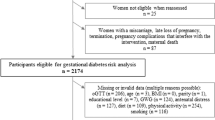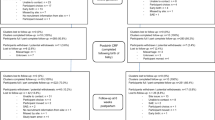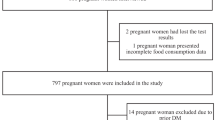Abstract
Objective:
The objective of this study was to evaluate weight-related risk perception in early pregnancy and to compare this perception between women commencing pregnancy healthy weight and overweight.
Study design:
Pregnant women (n=664) aged 29±5 (mean±s.d.) years were recruited from a metropolitan teaching hospital in Australia. A self-administered questionnaire was completed at around 16 weeks of gestation. Height measured at baseline and self-reported pre-pregnancy weight were used to calculate body mass index. Cross-sectional analysis was conducted.
Differences between groups were assessed using chi-squared tests for categorical variables and t-tests or Mann–Whitney U tests for continuous variables depending on distribution.
Result:
Excess gestational weight gain (GWG) during pregnancy was more important in leading to health problems for women or their child compared with pre-pregnancy weight. Personal risk perception for complications was low for all women, although overweight women had slightly higher scores than healthy-weight women (2.4±1.0 vs 2.9±1.0; P<0.001). All women perceived their risk for complications to be below that of an average pregnant woman.
Conclusion:
Women should be informed of the risk associated with their pre-pregnancy weight (in the case of maternal overweight) and excess GWG. If efforts to raise risk awareness are to result in preventative action, this information needs to be accompanied by advice and appropriate support on how to reduce risk.
This is a preview of subscription content, access via your institution
Access options
Subscribe to this journal
Receive 12 print issues and online access
$259.00 per year
only $21.58 per issue
Buy this article
- Purchase on Springer Link
- Instant access to full article PDF
Prices may be subject to local taxes which are calculated during checkout


Similar content being viewed by others
References
McIntyre HD, Gibbons KS, Flenady VJ, Callaway LK . Overweight and obesity in Australian mothers: epidemic or endemic? Med J Aust 2012; 196 (3): 184–188.
Chu SY, Callaghan WM, Bish CL, D'Angelo D . Gestational weight gain by body mass index among US women delivering live births, 2004–2005: fueling future obesity. Am J Obstet Gynecol 2009; 200 (3): 271.e271–277.
de Jersey SJ, Nicholson JM, Callaway LK, Daniels LA . A prospective study of pregnancy weight gain in Australian women. Aust N Z J Obstet Gynaecol 2012; 52 (6): 545–551.
Crozier SR, Inskip HM, Godfrey KM, Cooper C, Harvey NC, Cole ZA et al. Weight gain in pregnancy and childhood body composition: findings from the Southampton Women's Survey. Am J Clin Nutr 2010; 91 (6): 1745–1751.
Catalano PM, Ehrenberg HM . The short- and long-term implications of maternal obesity on the mother and her offspring. BJOG 2006; 113 (10): 1126–1133.
IOM (Institute of Medicine) and NRC (National Research Council) Weight Gain During Pregnancy: Reexamining the Guidelines. The National Academies Press: Washington, DC, 2009.
Gardner B, Wardle J, Poston L, Croker H . Changing diet and physical activity to reduce gestational weight gain: a meta‐analysis. Obes Rev 2011; 12 (7):e602–e620.
Thangaratinam S, Rogozińska E, Jolly K, Glinkowski S, Roseboom T, Tomlinson J et al. Effects of interventions in pregnancy on maternal weight and obstetric outcomes: meta-analysis of randomised evidence. BMJ 2012; 344: e2088.
Oteng-Ntim E, Varma R, Croker H, Poston L, Doyle P . Lifestyle interventions for overweight and obese pregnant women to improve pregnancy outcome: systematic review and meta-analysis. BMC Med 2012; 10 (1): 47.
Hilder L, Zhichao Z, Parker M, Jahan S, Chambers GM . Australia's Mothers and Babies 2012. In: Government A (ed). AIHW: Canberra, 2014.
Bandura A . Health promotion by social cognitive means. Health Educ Behav 2004; 31 (2): 143–164.
Schwarzer R, Sniehotta FF, Lippke S, Luszczynska A, Scholz U, Schuz B et al. On the Assessment and Analysis of Variables in the Health Action Process Approach: Conducting an Investigation. 2003 7/1/2010 [cited 2009 10/11/2009]. Available from http://web.fu-berlin.de/gesund/hapa_web.pdf.
Champion V, Skinner CS . The health belief model. In: Glanz K, Rimer BK, Viswanath K (eds). Health Behavior and Health Education: Theory, Research and Practice, 4th edn. Jossey-Bass: San Francisco, CA, USA, 2008.
Schwarzer R, Lippke S, Luszczynska A . Mechanisms of health behavior change in persons with chronic illness or disability: The Health Action Process Approach (HAPA). Rehabil Psychol 2011; 56 (3): 161–170.
Nitert MD, Foxcroft KF, Lust K, Fagermo N, Lawlor DA, O'Callaghan M et al. Overweight and obesity knowledge prior to pregnancy: a survey study. BMC Pregnancy Childbirth 2011; 11 (1): 96.
Kominiarek MA, Vonderheid S, Endres LK . Maternal obesity: do patients understand the risks? J Perinatol 2010; 30 (7): 452–458.
Amir LH, Donath S . A systematic review of maternal obesity and breastfeeding intention, initiation and duration. BMC Pregnancy Childbirth 2007; 7 (9).
World Health Organisation. Obesity: preventing and managing the global epidemic. Report of a WHO consultation. World Health Organ Tech Rep Ser 2000; 894 (1–8): 1–253.
Campbell MW, Williams J, Hampton A, Wake M . Maternal concern and perceptions of overweight in Australian preschool-aged children. Med J Aust 2006; 184 (6): 274–277.
Olson CM, Strawderman MS, Dennison BA . Maternal weight gain during pregnancy and child weight at age 3 years. Matern Child Health J 2009; 13 (6): 839–846.
Oken E, Taveras EM, Kleinman KP, Rich-Edwards JW, Gillman MW . Gestational weight gain and child adiposity at age 3 years. Am J Obstet Gynecol 2007; 196 (4): 322.e321–328.
Stotland NE, Haas JS, Brawarsky P, Jackson RA, Fuentes-Afflick E, Escobar GJ . Body mass index, provider advice, and target gestational weight gain. Obstet Gynecol 2005; 105 (3): 633–638.
Cogswell ME, Scanlon KS, Fein SB, Schieve LA . Medically advised, mother's personal target, and actual weight gain during pregnancy. Obstet Gynecol 1999; 94 (4): 616–622.
Health Statistics Centre Queensland Perinatal Statistics. Queensland Health, September 2010–February 2011.
Catalano PM . Increasing maternal obesity and weight gain during pregnancy: the obstetric problems of plentitude. Obstet Gynecol 2007; 110 (4): 743–744.
Olander EK, Atkinson L, Edmunds JK, French DP . The views of pre-and post-natal women and health professionals regarding gestational weight gain: an exploratory study. Sex Reprod Healthc 2010; 2 (1): 43–48.
Shub A, Huning EYS, Campbell KJ, McCarthy EA . Pregnant women's knowledge of weight, weight gain, complications of obesity and weight management strategies in pregnancy. BMC Res Notes 2013; 6 (278).
Ruiter RAC, Abraham C, Kok G . Scary warnings and rational precautions: a review of the psychology of fear appeals. Psychol Health 2001; 16 (6): 613–630.
Herring SJ, Platek DN, Elliott P, Riley LE, Stuebe AM, Oken E . Addressing obesity in pregnancy: what do obstetric providers recommend? J Womens Health 2010; 19 (1): 65–70.
Wilkinson SA, Poad D, Stapleton H . Maternal overweight and obesity: a survey of clinicians' characteristics and attitudes, and their responses to their pregnant clients. BMC Pregnancy Childbirth 2013; 13 (117).
Macleod M, Gregor A, Barnett C, Magee E, Thompson J, Anderson AS . Provision of weight management advice for obese women during pregnancy: a survey of current practice and midwives' views on future approaches. Matern Child Nutr 2013; 9 (4): 467–472.
Callaway LK, O'Callaghan MJ, McIntyre HD . Barriers to addressing overweight and obesity before conception. Med J Aust 2009; 191 (8): 425–428.
Weinstein ND . Why it won’t happen to me: perceptions of risk factors and susceptibility. Health Psychol 1984; 3 (5): 431.
Weinstein ND . Unrealistic optimism about susceptibility to health problems: conclusions from a community-wide sample. J Behav Med 1987; 10 (5): 481–500.
Sheeran P, Harris PR, Epton T . Does heightening risk appraisals change people’s intentions and behavior? A meta-analysis of experimental studies. Psychol Bull 2014; 140 (2): 511.
Peters G-JY, Ruiter RAC, Kok G . Threatening communication: a critical re-analysis and a revised meta-analytic test of fear appeal theory. Health Psychol Rev 2013; 7 (Suppl 1): S8–S31.
Arden MA, Duxbury AMS, Soltani H . Responses to gestational weight management guidance: a thematic analysis of comments made by women in online parenting forums. BMC Pregnancy Childbirth 2014; 14 (216).
Acknowledgements
The authors acknowledge New Beginnings Research staff and students for assistance with data collection, RBWH maternity outpatients’ staff for recruitment support and the women who participated. The authors are grateful to Dr Kimberley Mallan for feedback on statistical analysis for this manuscript. Project funding was provided by the Royal Brisbane and Women’s Hospital (RBWH) Foundation for the New Beginnings Healthy Mothers and Babies Study, RBWH Research Advisory Committee and National Health and Medical Research Council (NHMRC) provided PhD Scholarship funding (SJdeJ 1017169), JMN is funded by the Roberta Holmes Chair for the Transition to Contemporary Parenthood Program.
Author Contributions
SJdeJ conceived and designed the study with support from LKC, LAD and JMN. SJdeJ collected the data and performed the analysis. All authors contributed to the interpretation of results, drafting of the manuscript and approved the final manuscript for submission.
Author information
Authors and Affiliations
Corresponding author
Ethics declarations
Competing interests
The authors declare no conflict of interest.
Additional information
Supplementary Information accompanies the paper on the Journal of Perinatology website .
Supplementary information
Rights and permissions
About this article
Cite this article
de Jersey, S., Callaway, L., Daniels, L. et al. Weight-related risk perception among healthy and overweight pregnant women: a cross-sectional study. J Perinatol 35, 683–688 (2015). https://doi.org/10.1038/jp.2015.57
Received:
Revised:
Accepted:
Published:
Issue Date:
DOI: https://doi.org/10.1038/jp.2015.57
This article is cited by
-
A theory driven, pragmatic trial implementing changes to routine antenatal care that supports recommended pregnancy weight gain
BMC Pregnancy and Childbirth (2022)
-
Empowerment for behaviour change through social connections: a qualitative exploration of women’s preferences in preconception health promotion in the state of Victoria, Australia
BMC Public Health (2022)



